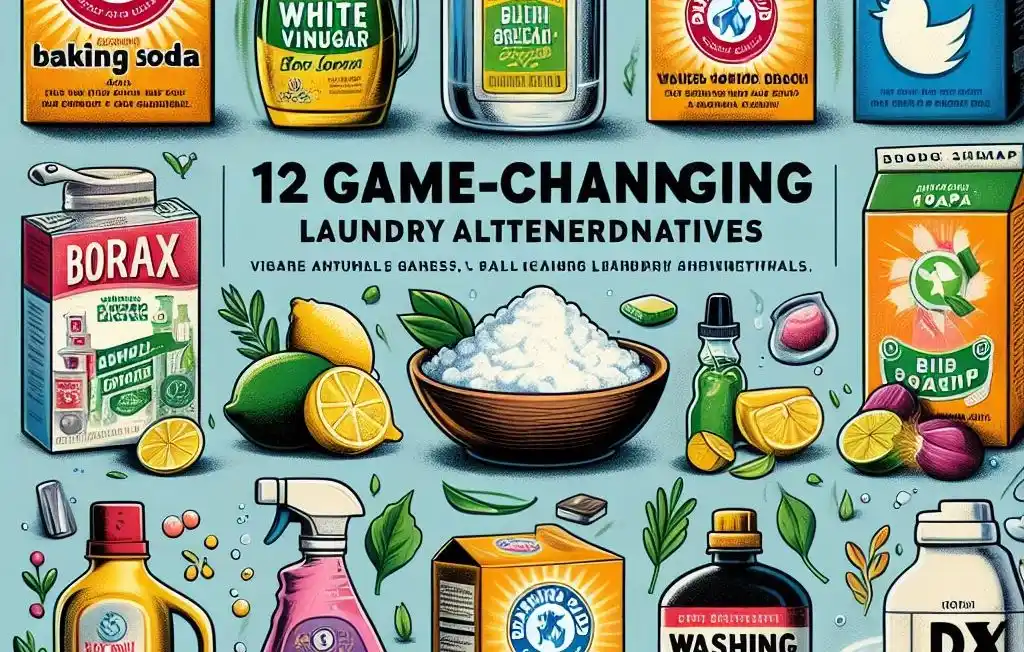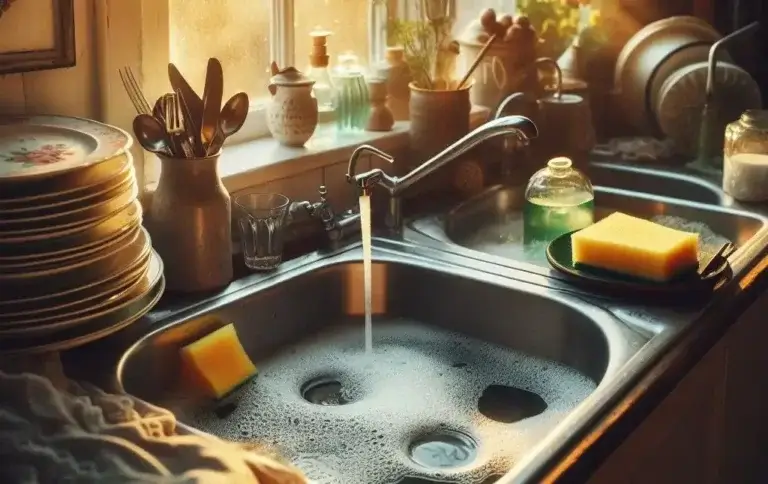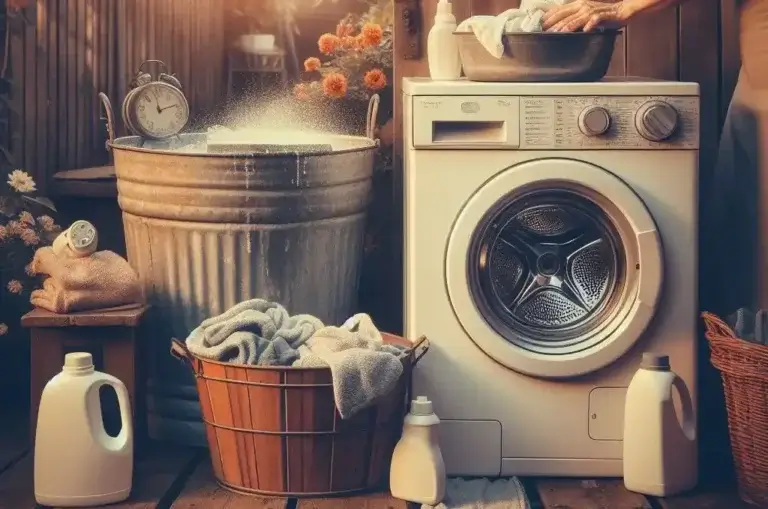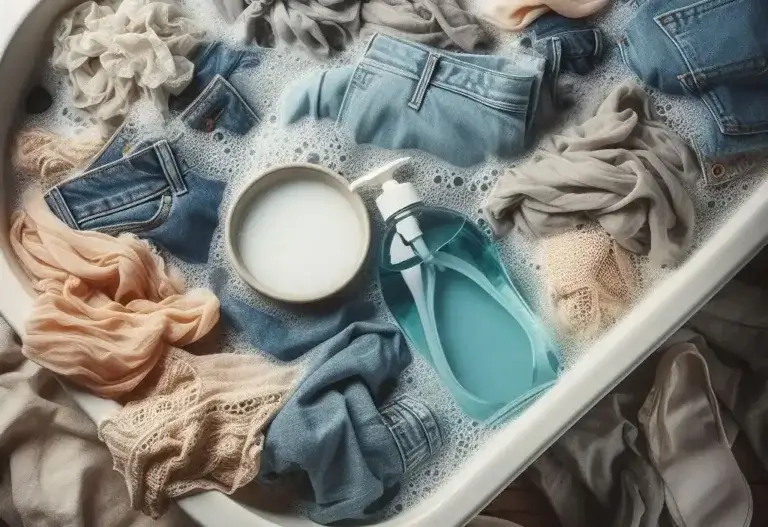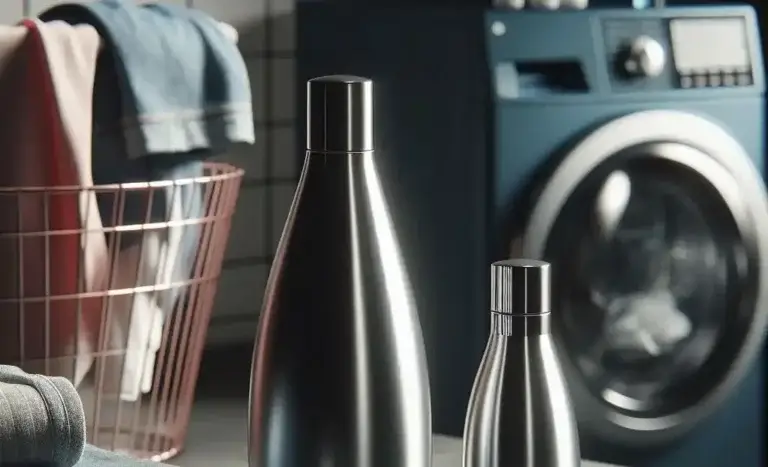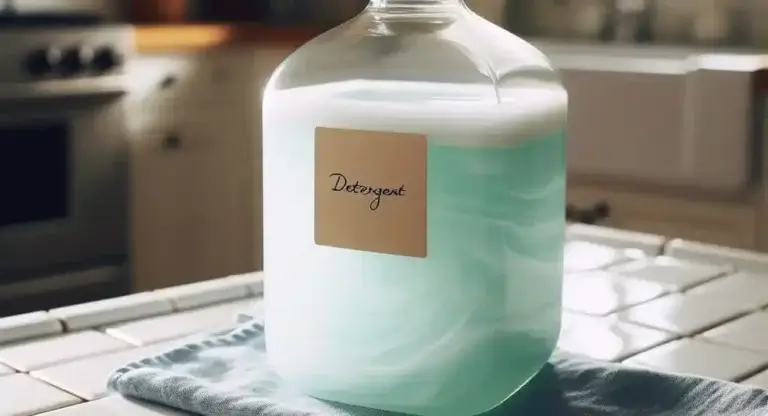What to Use Instead of Laundry Detergent in Washing Machine: 15 Emergency Substitutes
Have you ever found yourself standing in front of an open washing machine, soiled clothes in hand, only to realize you’ve run out of laundry detergent? We’ve all been there. When you’re out of laundry detergent and need to wash clothes, it can feel like an emergency. However, there are several viable laundry detergent substitutes and laundry detergent alternatives you likely already have at home.
In this comprehensive guide, we’ll cover everything you need to know about What to Use Instead of Laundry Detergent in Washing Machine: 15 Emergency Substitutes. From using baking soda to vinegar to lemon juice and more, we outline 15 emergency stand-in options for when you need to wash clothes but have no detergent. We also provide tips on how much of each substitute to use per load, what types of fabrics they work best on, and any precautions to take.
So read on to learn about all your options for tackling laundry when you’ve run out of detergent!
Table of Contents
What Happens if You Wash Clothes Without Detergent?
Before diving into substitutes, you might be wondering—what if I just skip the detergent entirely? Will water alone get my clothes clean?
Unfortunately, the answer is no. Water by itself cannot adequately permeate, lift away, and rinse out dirt, oils, and other grime the way laundry detergents can.
Detergent contains special surfactants that allow it to break down stains and grease while lifting the dislodged soils off the fabric surface so they can be rinsed cleanly away. Without these chemical cleaning agents, water won’t successfully remove lingering odors, set-in stains, or deeply embedded dirt when washing laundry.
Washing your clothes without detergent will likely just move the dirt and oil around rather than removing it. Your clothes will come out still smelling funky, looking dingy and discolored, and feeling stiff or rough to the touch from all the uncleared residues.
The good news is there are several household staples and cleaning products you can use in place of laundry detergent. While they might not work as well as an effective laundry detergent, they will certainly clean your clothes better than plain water alone.
Now let’s explore those detergent substitutes for when you’re in a pinch!
Can I Use Shampoo Instead of Laundry Detergent?
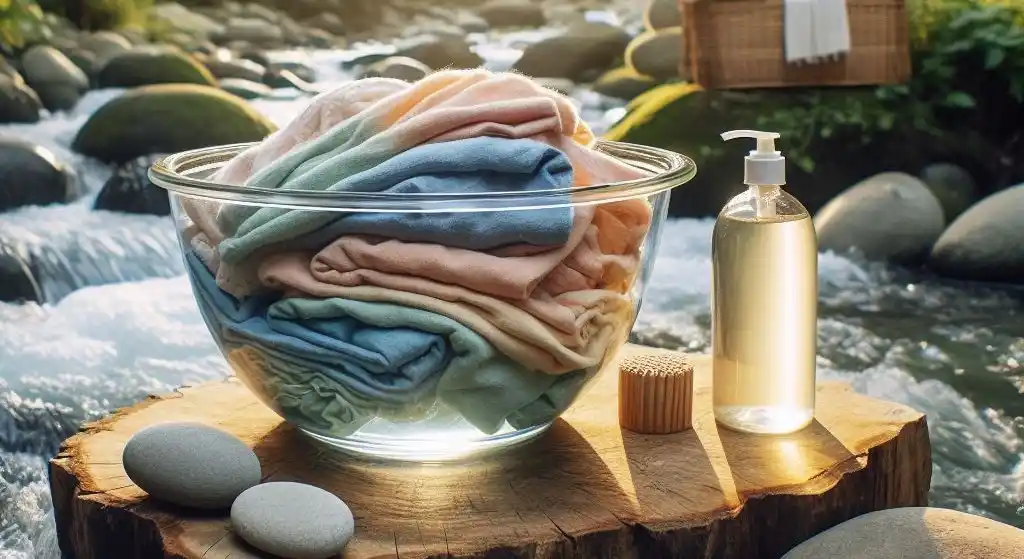
One of the most popular substitutes people turn to when they’re out of laundry detergent is shampoo. Using a small amount of shampoo in place of laundry detergent can indeed work in a pinch.
Shampoo contains some of the same basic ingredients as laundry detergent: cleaning agents called surfactants that help lift dirt, as well as fragrances. Because of these similarities, yes, you can use shampoo to effectively wash your clothes when you have no other alternative.
To use shampoo for laundry:
- Check the Label: Make sure you choose a gentle, clear shampoo without additives like conditioners or hair treatments. Baby shampoo is a great choice.
- Use Sparingly: Add only 1⁄4 to 1⁄2 cup of shampoo per load. Using too much can leave a stubborn detergent residue that’s hard to rinse away.
- Mind Fabrics: Avoid using shampoo on delicate silks or wools, which it can damage. Focus on sturdy cotton and synthetics.
The main downside to shampoo is that it doesn’t contain the same cleaning boosters laundry detergents rely on to tackle really dirty, dingy clothes or stained items. But it can work great in a pinch if your clothes just need a basic freshening up!
Is Vinegar a Good Laundry Detergent Substitute?
For a natural detergent alternative perfect for sensitive skin or a clean, fragrance-free wash, look no further than your kitchen pantry: vinegar makes an excellent DIY laundry detergent!
White vinegar is mildly acidic, which helps it dissolve residues that build up on fabric over time. This cutting ability enables it to permeate and loosen dirt and stains so they can be rinsed away.
Here’s how to put vinegar to work as a laundry detergent:
- Use Plain White Vinegar: Opt for distilled white vinegar rather than other varieties like apple cider vinegar or malt vinegar.
- Dose Properly: Add 1⁄2 to 1 cup of vinegar per laundry load.
- Mind Fabrics: Avoid using vinegar directly on silk or wool, which are prone to damage from acids.
- Rinse Thoroughly: Vinegar can leave behind a strong odor if any residual acid remains on clothes. Be sure to rinse laundry thoroughly after washing vinegar to fully eliminate acidic smells.
Do note vinegar might not remove stains as effectively as commercial detergent. But it can freshen up lightly worn items. For best stain-fighting results, consider using vinegar in combination with baking soda (more below).
Will Washing Clothes With Baking Soda Get Them Clean?
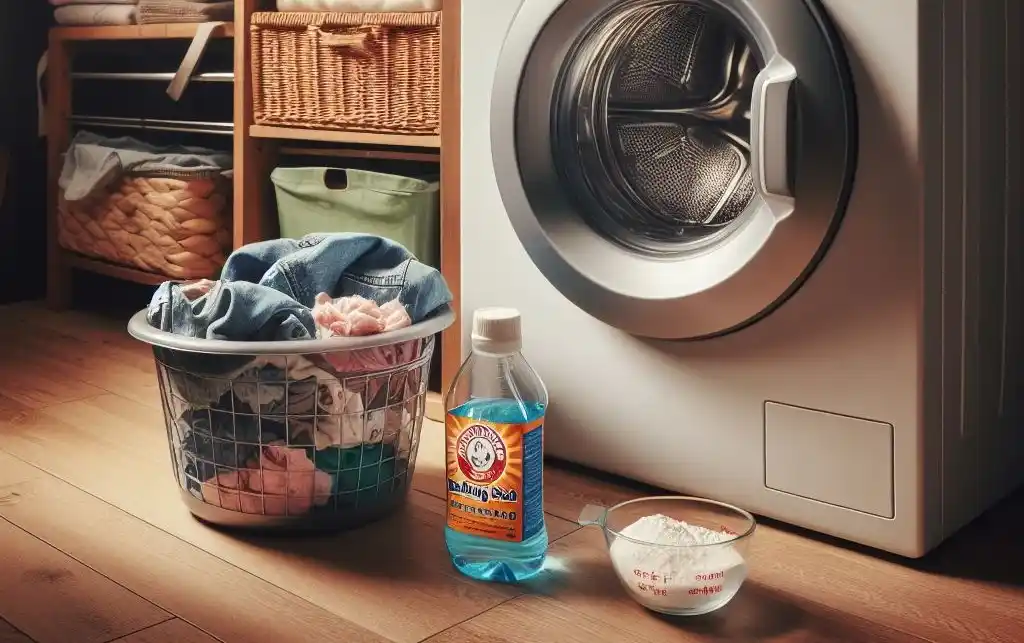
Like vinegar, baking soda is a versatile home staple that doubles as an effective DIY laundry detergent in a pinch. A laundry detergent made with baking soda works on the simple science of opposites attract.
Baking soda is alkaline, meaning it has a high pH. It works to dissolve acid-based stains and odors that build up on fabric over time from sweat, body oils, and other grime. Thanks to its alkaline nature, baking soda also naturally deodorizes as it cleans.
Here’s how to put this pantry staple to work on laundry:
- Use Sparingly: Add just 1⁄4 to 1⁄2 cup of baking soda per laundry load. More than this can leave a clumpy residue.
- Boost Cleaning Power: Combine with vinegar for stain-fighting chemical reaction (more below).
- Avoid Direct Contact With Skin: Baking soda can be irritating for conditions like eczema. Rinse clothes thoroughly after using.
One note with baking soda: it doesn’t produce many suds or bubbles when washing. So if you prefer soapy water, add a tablespoon of dish soap or bar soap along with the baking soda.
Does Lemon Juice Work as Laundry Detergent?
If you’ve ever used lemon juice as a DIY natural cleaner, you won’t be surprised to learn it also works to wash laundry. Similar to vinegar, the acidity in lemon juice helps it cut through alkaline residues like hard water buildup, soap scum, calcium deposits from sweat, and other grime on fabric.
Lemon laundry detergent also serves as a great deodorizer, leaving clothes fresh and bright. Here are some tips for using lemon juice to wash clothes:
- Use Freshly Squeezed Juice: Bottled lemon juice often has preservatives that can leave residues. Squeeze fresh lemons instead.
- Watch Fabrics: As an acid, lemon juice can damage delicate silks or wools. Stick to sturdy cotton, linens, etc.
- Combine With Baking Soda: For maximum cleaning power, put lemon juice’s acidity to work alongside alkaline baking soda.
- Rinse Thoroughly: Residual acids can damage fabric over time or leave a lemon scent behind if not fully rinsed.
Add about 1 cup of lemon juice (freshly squeezed from 2-3 lemons) per laundry load. If washing with baking soda too, use 1⁄2 cup lemon juice + 1⁄4 cup baking soda.
Can You Use Dish Soap to Wash Clothes?
If you’ve ever pretreated a stain with a dab of dish soap, you know this versatile cleaner’s degreasing abilities. So it makes sense that yes—you can use dishwashing detergent instead of laundry detergent to wash especially greasy, oily clothes or stained items when needed.
Dish soap contains surfactants that help cut through and lift away oils. The water-loving end loosens oil bonds so the oil-loving end can capture and rinse them away with water. These same surfactants allow dish soap to penetrate fabric and remove body oils and other greasy stains.
A few tips for using this detergent substitute:
- Choose Clear Formulas: Skip additives like moisturizers; they can leave a residue.
- Use Sparingly: 1-2 tbsp dish soap per load is plenty. Too much causes buildup and suds overflow.
- Target Greasy Stains: While good on oil-based stains, dish soap may not remove mud or dye stains as well as laundry detergent.
One thing to note with dish soap is that it doesn’t contain the same water softeners that laundry detergent does. So you may need to account for mineral residue and hard water buildup by adding a water softener like borax or washing soda (see below).
Will Bar Soap Successfully Clean Clothes?

Before commercial laundry detergents came along, generations of homemakers washed laundry using whatever bar soap the family used for bathing. So yes—any bar soap, whether lathering body soap or handmade castile soap, can effectively wash laundry too.
Bar soap contains basic cleansing ingredients like fats or oils combined with an alkali, most often lye. When the fats and oil molecules combine with the alkali, soap molecules form. These molecules bond to and lift away oils and some other substances that adhere to the fabric over time.
Here are some useful tips for washing with soap:
- Grate It First: Grate or shave bar soap into flakes or scraps first to help it dissolve and disperse more easily in the wash water.
- Mind Suds: Bar soap can create a lot of suds, which can overflow in HE washing machines. Rinse clothes well.
- Boost Stain-Fighting: Combine with borax or washing soda to combat stains better with bar soap.
While convenient in a pinch, bar soap may require more intense scrubbing to tackle really dirty clothes or might not fully permeate and rinse away residue. But it’s readily available in most homes to use for basic laundering needs.
Is it OK to Wash the Laundry Using Only Water?
As we covered at the start, washing clothes using only water with no detergent generally won’t remove odors, deeply set stains, or embedded dirt and oils. Water alone relies solely on mechanical temperature, friction, and agitation rather than chemical cleaning agents.
However, while not recommended for especially soiled, smelly clothes, washing garments using just hot or warm water with no detergent can work well:
✔️ For freshening lightly worn items like t-shirts that just need a quick refresh. The heat and motion release some odors.
✔️ As an extra rinse cycle after washing clothes with vinegar or baking soda. The added water flush further eliminates cleaner residue.
✔️ For items labeled “dry clean only” that need only a gentle surface freshening, like silks or delicates. Agitation in water alone is very mild.
So in certain circumstances, using water by itself can loosely “wash” laundry. But for any deep cleaning and stain removal, other detergent substitutes will work significantly better.
What About Washing Soda, Borax, or Oxygen Bleach?
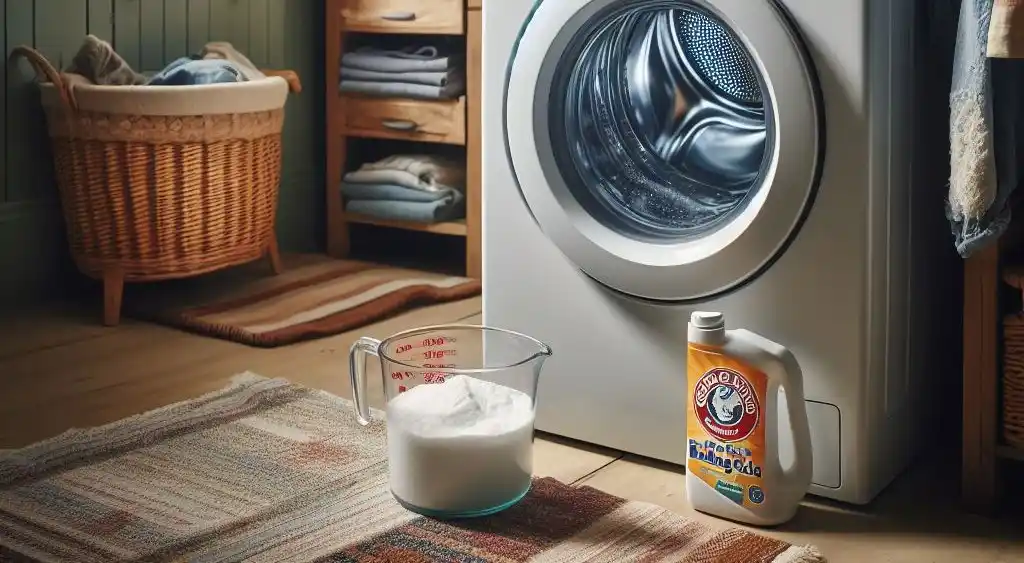
If you like keeping some old-fashioned laundry aids like washing soda, borax, or oxygen bleach on hand, these can serve as great laundry detergent replacements too. Let’s take a quick look at how each works:
Washing Soda
- What It Is: An alkaline salt that dissolves grease, oils, and stubborn residues.
- How to Use: Add 1⁄4 to 1⁄2 cup per load. Boosts stain removal but can damage fabrics if overused.
Borax
- What It Is: A natural mineral salt that softens water, deodorizes, and removes stains.
- How to Use: Add 1⁄4 to 1⁄2 cup borax per load with another detergent. Can irritate skin so rinse clothes thoroughly after using.
Oxygen Bleach
- What It Is: Uses hydrogen peroxide to lift stains rather than chlorine. Gentler than chlorine bleach.
- How to Use: Add 1⁄4 to 1⁄2 cup oxygen bleach as you would liquid chlorine bleach per laundry instructions.
These old-timey cleaning boosters work best when combined with other DIY laundry detergents. Washing soda and borax both leave mineral residue behind if overused or unchecked by an acid rinse aid like vinegar or lemon juice. And oxygen bleach won’t fully sanitize or brighten clothing the way chlorine bleach can. But they can serve as great helpers when making your laundry soap.
Should You Ever Use Chlorine Bleach as Laundry Detergent?
While they can seem similar at first glance in their bottles, liquid chlorine bleach (like Clorox) is NOT interchangeable with laundry detergent, despite also cleaning clothes. There are a few crucial differences:
Laundry Detergent…
- Cleans by lifting dirt and oils off fabric so they can be rinsed away
- Contains surfactants to penetrate fibers for debris removal
- May have enzymes to break down residues
Bleach…
- Brightens and disinfects by killing germs with chlorine
- Does NOT contain cleaning agents to remove stains, just cover them
- Can damage fabrics and washing machine parts over time
The biggest risk when using bleach in place of detergent is that it doesn’t remove dirt, stains, or odor molecules—it only camouflages them.
Pouring straight bleach onto smelly clothes won’t make the odors disappear, as it contains no degreasing agents or deodorizers. The stains will still exist underneath the bleached spots too. Bleach can prematurely break down elastic, colored fabrics, etc. with prolonged direct exposure.
The takeaway? While bleach has disinfecting abilities that detergent lacks, it should NOT replace regular washing. Use it only periodically to brighten and disinfect already cleaned laundry instead.
Can I Use Body Wash or Hand Soap in Place of Laundry Detergent?
In a pinch, yes—any kind of liquid body wash or bar hand soap can work to wash laundry if you have no other alternative. Like shampoo and dish soap, body wash and hand soap contain surfactants that enable them to penetrate and lift away some dirt and oils.
However, body cleansers also often contain oils, conditioners, exfoliants, and other additives meant specifically for skin that may leave behind residues in the laundry. Our skin wants moisture and nutrients from body products that fabric doesn’t need.
So while that pink pomegranate body wash might make your clothes smell fruity, it could also leave them feeling less fresh and clean in the long run than a purer detergent substitute would. But ultimately, it WILL technically wash clothing better than plain water if in emergency need.
Just be sure to rinse any hand or body soap extremely thoroughly from the laundry afterward to eliminate oily residues. Vinegar in the rinse cycle helps cut through buildup. And stick to clear gel formulas instead of creamy opaque soaps when possible.
What’s the Best DIY Laundry Detergent Substitute Recipe?
If you don’t need to wash laundry immediately and can wait until after a quick shopping trip, the best emergency DIY laundry detergent recipe is:
Ingredients
- 1 cup washing soda
- 1 cup borax
- 1 cup distilled white vinegar OR lemon juice
- 1⁄2 cup natural liquid soap like Castile
- 30-40 drops essential oil (optional for fragrance)
Instructions
- Mix the washing soda and borax thoroughly in an airtight jar or container. This alkali powder mix tackles stains and mineral buildup.
- Mix the 1 cup vinegar or lemon juice into your liquid soap. The acidity of the vinegar/lemon juice cuts through alkaline soiling while the soap provides cleaning power and bubbles.
- To Wash Laundry: First add 2 tbsp of the alkali powder mixture to balance out hard water and lift stains. Then add 1⁄4 cup (4 tbsp) of the vinegar-soap liquid mixture. The acid-alkali reaction supercharges cleaning!
- Add your laundry to the washing machine basin along with the 2 laundry powder + 1 liquid mixture. Run a full wash cycle. Add an extra rinse cycle afterward.
- Use within 3 months. The vinegar acid degrades the natural soap over time.
This DIY powder + liquid laundry soap combo provides both cleaning ingredients AND water softening ability missing from many singular substitutes to replicate detergent functionality very closely. Customize the essential oil to your favorite aroma. Great in a pinch!
Tips for Doing Laundry Without Store
Here are tips for doing laundry without store-bought detergent:
Adjust the Settings on the Washer
Many homemade alternatives to detergent, like baking soda or vinegar, have less sudsing ability. So be sure to disable automatic suds or lather sensors on HE (high-efficiency) washing machines before doing a homemade detergent load. Otherwise, the washer may improperly add too much rinse water.
Similarly, because natural cleaners produce fewer bubbles, they also provide less cushioning friction. So opt for a “heavy duty” or “sturdy” clothing setting rather than “delicates” to provide more agitation force and compensation.
Soak Stubborn Stains First
While homemade cleaners like lemon juice and borax lift some stains, really set-in grease or dirt spots often require robust enzymes and surfactants found in commercial detergents to break their bonds.
If you have especially grimy laundry, try first soaking heavily stained items in very hot water for 30-60 mins before washing. The heat helps loosen stain bonds before DIY cleaner application. Just don’t boil silks or wools!
You can also spot and treat stubborn marks with concentrated lemon juice, vinegar, or a paste of baking soda and water beforehand. Let it sit for 5-10 minutes before adding the garment to the full wash.
Double Rinse
Home solutions like vinegar, body wash, or bar soap tend to leave more residue behind on laundry than formulated detergents. So be sure to run an extra rinse cycle after washing laundry without commercial detergent to remove cleaner cling.
Vinegar in particular can leave fabrics with a sour smell if acidic residues aren’t fully flushed away. An extra rinse ensures homemade cleaners get fully diluted for fresh laundry. Bleach-alternative boosters like baking soda also require thorough flushing to prevent skin irritation.
Line Dry When Possible
To save wear and tear on laundry washed without the lubricating oils and fabric guard polymers in store detergent, line dry items when possible rather than machine drying. The heat and friction inside electric dryers can damage clothes cleaned only with DIY solutions.
If you must machine dry, opt for low heat and add a few clean tennis balls or wool dryer balls to provide gentle tumbling friction instead. And avoid over-drying; it exacerbates roughness.
Rotate DIY Detergents
It’s best not to use the same homemade detergent every single load in perpetuity. Vinegar, lemon, and soap residue left behind can accumulate over successive washes if not fully rinsed away. This builds up and leaves fabrics dingy.
Instead, rotate between a couple of homemade solutions like lemon juice, soap, baking soda, etc, and occasionally “reset” laundry with a full detergent wash. Keeping some non-acid options like soap in the mix prevents total pH imbalance too. Variety prevents compounding buildup issues!
Frequently Asked Questions
Can I wash white clothes with baking soda?
Yes! Baking soda is safe for washing all white fabrics. Its alkaline properties can help boost stain removal, whiten discolored areas, and remove buildup that makes whites dull.
Just be sure to add baking soda at the start of the cycle so acids from grime can fully react and lift away. Don’t leave baking soda sitting dry on fabric too long before washing, as concentrated alkali can damage cloth over time.
What home ingredient is closest to laundry detergent?
Of all the singular home products that can substitute for laundry detergent in a pinch, Castile or other natural liquid soap comes closest in its cleansing abilities. Bar soap also contains similar cleaning ingredients but requires more agitation to penetrate the fabric.
The other benefit of liquid soap over vinegar, baking soda, etc – it dissolves and lifts away oils and dirt rather than just deodorizing or brightening them. For the most similar clean, opt for an unscented dish or hand soap without skin conditioners.
Can I add essential oils to my DIY laundry detergent?
Yes, adding several drops of essential oil is a great way to naturally scent homemade laundry soap. Good options include lemon, lavender, peppermint, tea tree, eucalyptus, rosemary, orange and more.
Just be aware that like commercial fragrance oils, EOs can still sometimes irritate sensitive skin. It’s best to skip fragrance entirely for baby clothes and undergarments. Stick to no more than 20-30 drops of essential oil per batch or they may overwhelm.
What’s the white stuff left on clothes after using DIY laundry detergent?
White mineral residue, flaky bits, or powder left behind on clothes after washing with baking soda, borax, or washing soda are usually undissolved particles of these cleaners left clinging to the fabric.
To prevent this kind of detergent substitute buildup on laundry, be sure to add acidic ingredients like lemon juice or vinegar too. Their acidity reacts with alkaline salts to fully dissolve cleaner residues away rather than leaving chunky bits behind.
Can I wash workout clothes without detergent?
It’s best not to rely solely on water for sweaty athletic wear, as the soils in sweat and body oils bind tightly to fabric. Vinegar, body wash, or lemon juice offer some help by dissolving the compound buildup.
But avoiding true detergent with enzymes means microbes can continue growing in stuck-on residues. So at minimum, occasionally wash athletic clothes with oxygen bleach to kill bacteria and sanitize leftover grime water alone leaves behind.
The Takeaway: Top Laundry Detergent Alternatives in a Pinch
If you ever find yourself staring down a basket of dirty clothes but are fresh out of laundry detergent, take heart – there ARE still ways to get your laundry clean without running to the store!
While no singular substitute can match the cleaning power of detergent completely on its own, options like vinegar, lemon juice, baking soda, liquid soap, and more used properly can freshen up odorous clothing and lightly worn items when needed in a pinch.
Combining DIY cleaners like soda, soap, and vinegar creates an alkali/acid reaction that takes on even more grime. With the right pairing, these homemade solutions tackle stains and lift away dinginess surprisingly well!
So next time you encounter an empty detergent bottle and dirty clothes that need washing, try out one of these effective laundry detergent substitutes using household staples you likely already have on hand. Just be sure to rinse extremely thoroughly after using any homemade mix. Your family’s wardrobe will stay fresh until you can restock!

